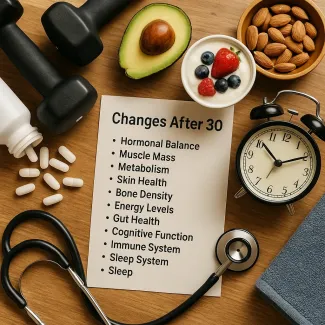
Wake Up Without Pain: How to Start Your Day With a Healthier Back
Discover the morning habits that help relieve and prevent lower back discomfort
Why back pain is often worse in the morning
Waking up with a stiff, painful back is a common issue that affects millions of adults, particularly those over 30. While pain throughout the day can have many causes, morning back pain is frequently tied to poor sleep posture, inadequate mattress support, or underlying inflammation. During the night, your body enters periods of reduced mobility, leading to fluid accumulation in spinal discs and surrounding tissues. This can intensify stiffness, especially in the lumbar region, upon waking.
Inflammatory back pain, often associated with conditions like ankylosing spondylitis, also tends to worsen during periods of rest. On the other hand, mechanical back pain related to posture, muscular strain, or intervertebral disc problems may appear worse after inactivity. Identifying the root cause is the first step toward managing your symptoms effectively.
The role of sleep posture in morning back pain
How you sleep affects your spinal health more than you may think. Certain sleep positions misalign the spine, put pressure on the lower back, and can aggravate or even cause pain.
Sleeping on your stomach, for instance, twists your neck and back into awkward angles and places continuous stress on the lumbar spine. Conversely, sleeping on your back with a small pillow under your knees or on your side with a pillow between your knees can help maintain the spine’s natural curvature.
Switching to a more ergonomic sleep position may not feel natural at first, but with practice and minor adjustments—such as changing pillow height or adding lumbar support—it can significantly reduce chronic morning pain.
How mattress firmness affects spinal alignment
Your mattress can either support your spine or work against it. An overly soft mattress allows the body to sink, causing spinal misalignment during the night. On the other hand, a mattress that is too firm can put excessive pressure on joints, especially in the shoulders and hips.
The ideal choice is a medium-firm mattress that supports the natural curves of the spine while relieving pressure points. Many studies support the notion that medium-firm memory foam or hybrid mattresses help reduce back pain by providing a balanced mix of contour and support.
If your mattress is over eight years old or has visible sagging, it may be time for a replacement. Modern sleep products, including adjustable bases and orthopedic mattresses, offer customizable support that aligns with your unique body shape and sleep preferences.
Morning stretches to relieve back tension
Gentle stretching is one of the most effective ways to release muscle stiffness and increase mobility in the lower back after waking. A 5–10 minute morning stretch routine can make a substantial difference in your daily comfort and help prevent further injury.
Recommended morning stretches for back pain relief:
- Child’s Pose (Balasana): Helps elongate and decompress the spine
- Cat-Cow Stretch: Promotes spinal flexibility and warms up muscles
- Pelvic Tilt: Strengthens abdominal muscles and reduces lumbar strain
- Knee-to-Chest Stretch: Relieves lower back tension and improves blood flow
- Supine Twist: Enhances spinal mobility and reduces stiffness
For best results, breathe deeply, move slowly, and avoid jerky movements. Always listen to your body—if a stretch causes sharp or increased pain, stop immediately.
Strengthening exercises to prevent recurrence
Stretching may relieve current discomfort, but strengthening key muscle groups is essential to preventing future back pain. Core weakness is a primary contributor to poor posture and excessive pressure on the lower spine.
Daily or thrice-weekly exercises that engage the core, glutes, and lower back can help support your spine:
- Bridge Pose: Strengthens the glutes and lower back
- Bird Dog: Improves coordination and builds spinal stability
- Plank: Activates the deep core muscles
- Wall Sit: Builds endurance in the lower body and promotes good posture
- Dead Bug: Targets abdominal and pelvic control
Include these exercises in your daily morning or evening routine. Start slow and gradually increase reps or duration as your strength improves.
Impact of hydration and inflammation on back pain
Dehydration affects the intervertebral discs, which rely on fluid for shock absorption. Overnight, your body naturally becomes dehydrated, which can make discs more susceptible to compression and pain.
Drinking a glass of water soon after waking helps hydrate spinal structures and supports metabolic function. Chronic inflammation, influenced by poor diet and stress, also plays a major role in persistent back discomfort.
Foods that may reduce inflammation and support spine health:
- Omega-3 rich fish (salmon, mackerel, sardines)
- Leafy greens (spinach, kale)
- Berries (blueberries, strawberries)
- Nuts and seeds (especially walnuts and flaxseed)
- Turmeric and ginger
Limiting processed foods, added sugars, and refined carbohydrates can further reduce inflammatory load and support musculoskeletal health.
Breathing techniques to relax tense back muscles
Stress contributes to muscle tension, particularly in the upper and lower back. Incorporating controlled breathing exercises in the morning can help calm the nervous system and reduce muscular stiffness.
Try this simple box breathing technique:
- Inhale for 4 seconds
- Hold breath for 4 seconds
- Exhale slowly for 4 seconds
- Hold again for 4 seconds
- Repeat for 3–5 minutes
This method promotes parasympathetic activation, reducing cortisol and encouraging deeper relaxation.
The role of weight and body mechanics in morning pain
Being overweight or having a sedentary lifestyle significantly increases your risk of spinal discomfort, particularly in the morning. Excess abdominal weight shifts the body’s center of gravity forward, which puts extra pressure on the lumbar vertebrae.
Engaging in daily low-impact exercise, such as walking or swimming, helps reduce weight, improve blood circulation, and maintain spinal integrity.
Additionally, becoming more conscious of body mechanics during the day, such as when lifting objects or standing for long periods, will reduce strain and promote long-term spinal health.
Ergonomic changes to your sleeping environment
Improving your sleep hygiene and the environment in which you rest can have a major impact on your back health. Consider making the following ergonomic adjustments:
- Choose a mattress suited to your body weight and sleep position
- Use a pillow that aligns your neck with your spine
- Keep your bedroom cool and dark to promote deep, restorative sleep
- Reduce screen exposure before bed to avoid melatonin disruption
- Try adjustable beds that offer inclined back or leg support
These improvements can enhance sleep quality and allow muscles to recover more efficiently, minimizing morning discomfort.
Best daily habits to reduce risk of back pain
Integrating healthy habits into your lifestyle can drastically reduce your chances of experiencing daily or morning back pain:
- Stretch after waking and before bedtime
- Stay active during the day – avoid long periods of sitting
- Maintain a healthy weight to reduce load on the spine
- Sleep on your side or back with ergonomic support
- Use lumbar support when sitting for extended periods
- Strengthen core muscles regularly
- Hydrate consistently
These behaviors promote a resilient musculoskeletal system and encourage better posture and mobility, even as you age.
When to seek professional help for back pain
While occasional stiffness may not be cause for concern, persistent or worsening pain, especially if it radiates to the legs, causes numbness, or interferes with daily function, should not be ignored.
Consider visiting a:
- Physiotherapist for structured rehabilitation and postural correction
- Chiropractor for spinal adjustments and alignment
- Orthopedic specialist to rule out disc herniation or degenerative disorders
- Rheumatologist if inflammatory back conditions like ankylosing spondylitis are suspected
Early diagnosis can prevent chronic disability and lead to better long-term outcomes.
Natural supplements that support spinal health
Certain natural remedies and supplements may help manage inflammation, nerve health, and joint function. These include:
- Magnesium: Supports muscle relaxation and nerve function
- Vitamin D: Essential for calcium absorption and bone integrity
- Turmeric (curcumin): Anti-inflammatory properties
- Collagen peptides: Aid in joint and disc health
- Omega-3 fatty acids: Help reduce chronic inflammation
Consult with a healthcare provider before starting any new supplement, especially if you’re taking medication or have existing conditions.
Daily mobility tips for the workplace
Spending long hours sitting at a desk can worsen lumbar tightness and morning stiffness. To counteract this, integrate movement into your daily routine:
- Use a standing desk or adjustable workstation
- Take stretch breaks every 30–60 minutes
- Sit with feet flat and knees at hip level
- Avoid slouching and keep shoulders relaxed
- Use a supportive chair with lumbar contour
These minor shifts help preserve spinal curvature and keep muscles active throughout the day.
How hormones and age affect back pain
After age 30, hormonal fluctuations—especially in women—can impact muscle tone, joint fluidity, and pain sensitivity. Reduced estrogen levels, for example, may lead to increased inflammation and a higher risk of disc degeneration.
Simultaneously, natural aging leads to:
- Loss of disc hydration
- Reduced muscle elasticity
- Decreased core strength
These changes make the back more prone to pain, especially in the morning. Staying active, maintaining strength, and eating a nutrient-rich diet can slow these effects and preserve comfort.
Psychological factors that influence pain perception
Stress, anxiety, and poor mental health can significantly amplify pain perception. The brain processes emotional and physical pain through shared pathways, meaning your emotional state can make back pain feel worse.
Incorporate the following strategies to manage your emotional health:
- Mindfulness meditation
- Breathing exercises
- Therapeutic journaling
- Professional counseling
Reducing psychological stress improves not only your emotional wellbeing but also the intensity and frequency of back pain episodes.
What to avoid if you wake up with back pain
Certain common reactions can worsen back discomfort in the morning:
- Skipping stretches and going straight into daily tasks
- Lying back in bed instead of moving gently
- Taking anti-inflammatories on an empty stomach
- Using poor footwear with inadequate arch support
- Carrying heavy bags immediately after waking
Being mindful of these habits helps you start your day with less strain and gradually prepares your body for activity.





